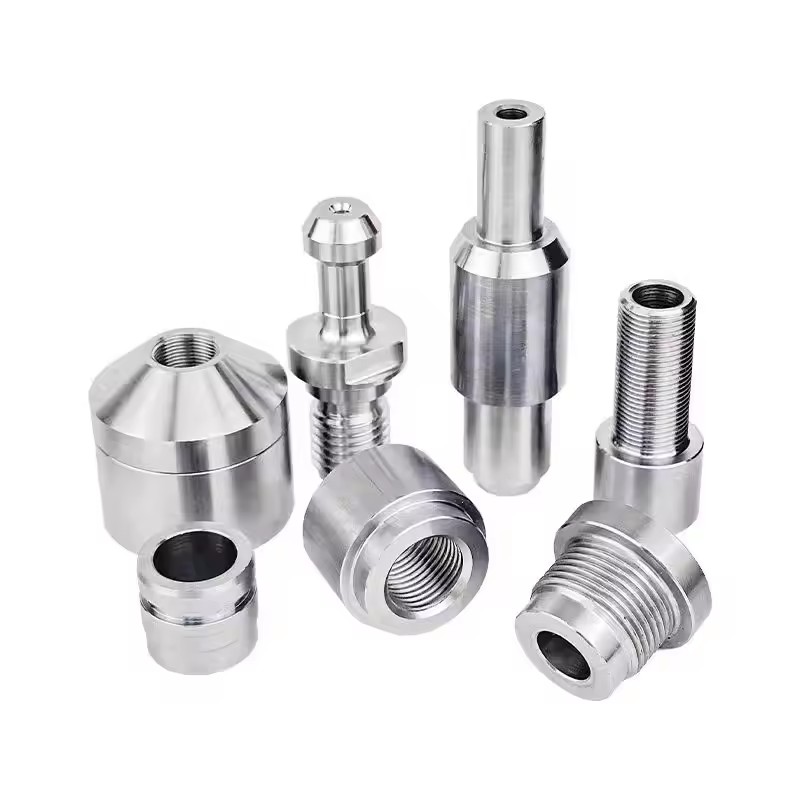
Precision Turned Parts
Precision Turned Parts are high-precision components manufactured using CNC (Computer Numerical Control) turning machines. These parts are typically made from metals or plastics and are characterized by tight tolerances and complex geometries. Precision Turned Parts are widely used across various industries due to their accuracy, consistency, and ability to meet stringent quality standards. They are essential in applications where reliability and precision are critical, such as in medical devices, electronics, automotive, and aerospace industries.
The manufacturing process involves rotating a workpiece while a cutting tool removes material to achieve the desired shape and dimensions. CNC turning allows for high repeatability, ensuring that each part is produced with consistent quality. Precision Turned Parts can include shafts, pins, connectors, bushings, and other custom-designed components tailored to specific applications.

Characteristics of Precision Turned Parts
High precision: The core feature of Precision Turned Part is its high precision. The dimensions and shapes of these parts are manufactured according to strict standards and tolerances to ensure accurate fit during assembly and use, achieving the predetermined functions and performance.
High quality: Due to the use of advanced processing technology and strict quality control measures, Precision Turned Parts typically have excellent quality. Their surface smoothness is high, the material structure is uniform, and there are no defects such as pores and slag inclusions, which can meet various complex and harsh working conditions.
Diversity: Precision Turned Parts can be manufactured from various materials, including metals, plastics, ceramics, etc. These parts are widely used in fields such as automotive, aerospace, electronics, medical, etc., to meet the demand for high-precision parts in different industries.
Customization: Precision Turned Parts are usually customized based on the specific needs and drawings of the customer. Manufacturers can choose appropriate materials and processing techniques based on the drawings and requirements provided by customers to manufacture parts that meet their requirements.

Precision Turned Part has high requirements for machine tools to ensure the production of high-precision and high-quality parts:
Machining accuracy requirements: The machine tool needs to have extremely high machining accuracy to meet the tolerance requirements of Precision Turned Parts. For example, the machining accuracy of machine tools should be able to reach hundreds of millimeters or even higher to ensure the dimensional and shape accuracy of the parts.
Stability and rigidity: Machine tools need to have good stability and rigidity to reduce errors caused by vibration and deformation during the machining of Precision Turned Parts. The structural design of the machine tool should be reasonable and able to withstand cutting forces and thermal deformation during the machining process, ensuring the machining quality of the parts.
CNC system: Precision turning usually relies on CNC systems to achieve automation and efficient production. Therefore, machine tools need to be equipped with advanced CNC systems that can accurately control parameters such as tool movement trajectory, cutting speed, and feed rate to achieve high-precision machining.
Tools and fixtures: Precision turning requires the use of high-quality tools and fixtures to ensure the stability and machining accuracy of the Precision Turned Parts cutting process. The cutting tool needs to have good wear resistance and cutting performance, and the fixture needs to be able to firmly fix the workpiece to prevent displacement or deformation during the machining process.

Applications of Precision Turned Parts
Medical Devices
Precision Turned Parts are crucial in the medical industry, where accuracy and reliability are paramount. They are used in surgical instruments, implants, diagnostic equipment, and drug delivery systems. For example, components like bone screws, catheter tips, and syringe barrels are often manufactured using precision turning to ensure they meet strict medical standards.
Electronics
In the electronics industry, Precision Turned Parts are used in connectors, housings, and sensor components. These parts require high precision to ensure proper fit and functionality in devices such as smartphones, computers, and communication equipment. For instance, tiny connectors and pins used in circuit boards are often produced using CNC turning.
Home Appliances
Precision Turned Parts are found in various home appliances, including washing machines, refrigerators, and air conditioners. They are used in components like motor shafts, valves, and fittings, where precision and durability are essential for smooth operation and longevity.
Sports Goods
In the sports industry, Precision Turned Parts are used in equipment such as bicycles, golf clubs, and fitness machines. For example, lightweight and durable components like bike pedals, gear shifters, and exercise machine bearings are often manufactured using precision turning to ensure high performance and reliability.
Precision Turned Parts play a vital role in these industries by providing high-quality, reliable, and custom-designed components that meet the specific needs of each application. Their versatility and precision make them indispensable in modern manufacturing.
